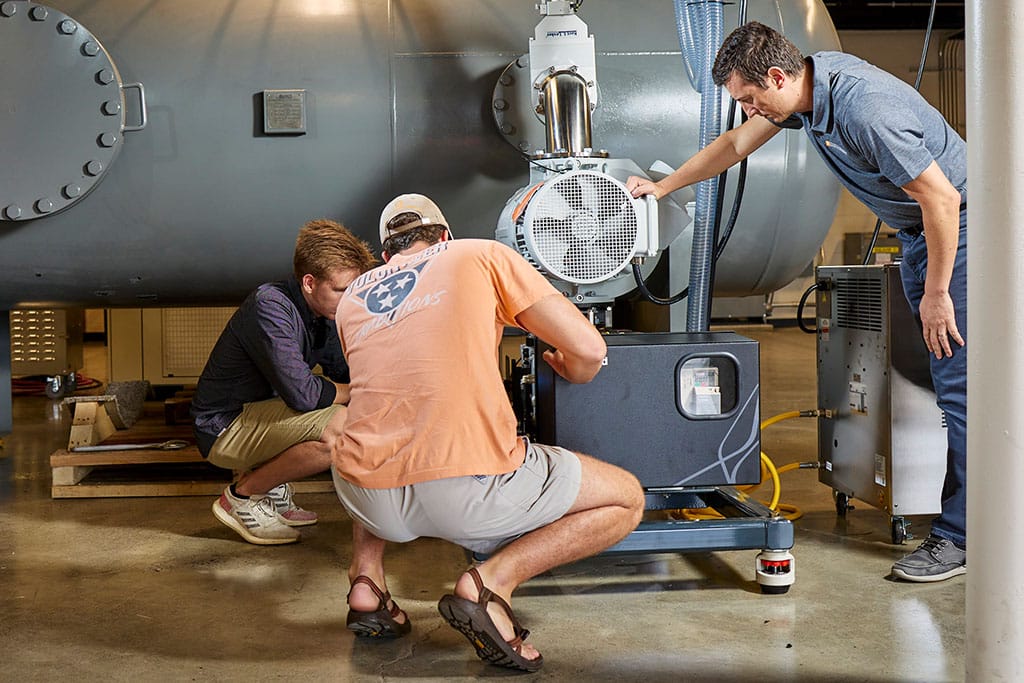Graduate programs
MS in Aerospace Engineering
The MS in aerospace engineering at UT offers our students the chance to dive deeper into the science of flight, propulsion, and space systems. With nationally recognized faculty and cutting-edge research facilities both in Knoxville and in Tullahoma, this program is ideal for engineers seeking to expand their expertise and prepare for advanced technical roles or doctoral study.
Program Overview
The aerospace engineering provides graduate-level instruction in areas such as aerodynamics, propulsion, flight mechanics, orbital mechanics, aerospace materials, and computational modeling. Students may pursue a thesis or non-thesis option, depending on their career goals. The program is designed to support both recent graduates and working professionals, offering flexibility and research opportunities through partnerships with the UT Space Institute, NASA, and industry leaders.

Why Study at UT?
UT’s strong aerospace legacy includes alumni who have become NASA astronauts, national lab researchers, and industry innovators. The program offers hands-on experience with hypersonics, UAV design, and high-performance computing, as well as access to resources through the UT Space Institute. With close ties to Oak Ridge National Laboratory and a collaborative academic environment, the MS program equips students with the skills and experience to thrive in one of the world’s most advanced and fast-moving engineering fields.
Five-Year BS/MS Program
Undergrad students at UT seeking to accelerate their MS degree can apply for the Five-Year MS/BS program which allows for students to take up to nine credit hours which apply to both their graduate and undergradate degrees.
Dual MS/MBA Program
The Haslam College of Business and the Tickle College of Engineering offer an integrated program leading to the conferral of both a Master of Business Administration degree with a major in Business Administration and a Master of Science degree in aerospace engineering.

Our Curriculum
The program offers two flexible paths to fit your academic and professional goals. Both paths are designed to provide a strong foundation for careers in aerospace or continued study at the doctoral level.
Thesis Option
The thesis option is ideal for students who want to dive deep into research and contribute original work to the field. This path includes a written thesis and a final comprehensive exam, which focuses primarily on the student’s research but may also cover relevant coursework.
Non-Thesis Option
For those seeking a more coursework-focused experience, the non-thesis option allows students—especially working professionals or off-campus participants—to tailor their studies through advanced classes and a final project. This option includes a comprehensive written exam covering all coursework, as well as a project report with both written and oral components.
Coursework Requirements
The chart below demonstrates the course requirements for both the Thesis and Non-Thesis options. For more information about required coursework, use the link below.
| Coursework | Thesis Option | Non-Thesis Option |
|---|---|---|
| Thesis | ≥6 credit hours | 0 credit hours |
| Courses in Major (500 or above) | ≥12 credit hours | ≥18 credit hours |
| Mathematics (400 or above) | ≥6 credit hours | ≥6 credit hours |
| Engineering courses below 500 | ≥3 credit hours | ≥3 credit hours |
| Total | ≥30 credit hours | ≥30 credit hours |

Join Us on Rocky Top
Apply to Grad School
Ready to become an Engineering Vol? Want to learn about our admission requirements for Grad School? Use the links below to learn more about how to join our Volunteer community!
